Consider Your Garden A Life Raft
By Trish Beckjord
Last October I wrote about the worrying decline in the populations of a number of North American bird species. Now Science has just published the results of a study earlier this month that looked at climate change and its possible relationship to observed declines in bumble bee populations. As a result of the changing climate, our world is experiencing greater temperature swings with higher highs than usual. Perhaps you have felt this the last few years. It turns out bumble bees have felt it too.
Scientists from the University of Ottawa evaluated long term data for occurrences of 66 different bumble bee species and concluded these temperature swings are contributing to local extinction of bumble bee populations plus other impacts independent of any changes in land use or condition. It is thought this is because these variations are exceeding the bees genetically programmed tolerance for such conditions.
So our bees are getting double and triple whammied out there what with loss of habitat, poor quality and little support from most of what is remaining, introduced parasitic infections, pesticides, and more. What’s a concerned person to do?
Certainly what we can do best in our own yards is provide the best habitat as we can for these critters and other pollinators. Many of you know this and are already working in this direction. If not, read on! Well, even if, read on anyway!
February is a time our thoughts start to turn to our gardens. What do we want to add? Is this the year to convert more lawn and add more garden? Is our garden living up to its potential in terms of all those “ecosystem services” it can provide such as carbon storage, habitat, food, shelter, shade, safe nesting sites, water to say nothing of the beauty and vibrancy it can offer? What are the ways in which I can enhance it?
Recently I turned back to an older book in my library that some of you may have: Noah’s Garden published in 1993 by Sara Stein. You would think we would have progressed in garden wisdom from what was written almost 30 years ago. But it turns out not by much! Here are some nuggets from Noah’s Garden. I suggest picking it up and re-reading it while we await the warmer temperatures of spring!
“…A fundamental disparity is that plants grow where they can, whereas gardeners grow plants where they will…Gardening strives to defeat the odds, and to do so, is necessarily hard work…” I am reminded of finding the Great Blue Lobelia I planted in my rain garden growing more happily near the overflow for my rain barrel and the Little Bluestem that clearly preferred it next to my sidewalk!
“…Ecology is a far cry from horticulture. Gardeners see aphids as enemies, moles as nuisances, and snakes as something the world would be well off without. Ecology sees all species connected in such a mesh of interdependence that one hardly dares step on an ant…” Perhaps a harbinger of Bringing Nature Home?
“…We did all this and more (on their newly purchased six acres). We cleared brush and pulled vines and hauled rocks and broke ground and dug beds until, after years of high hopes and hard work, we had an expanse of landscaped grounds and gardens that seemed to us like Eden. Then it hit. I realized in an instant the full extent of what we had done: we had banished the animals from this paradise of ours…” Clearly this was when the author gardened from a horticultural perspective…
“…But all of us live within an ecosystem; like the Bluebird of Happiness, Nature is in our own back yard…”
Noah’s Garden was the wake-up call that perhaps what got many of us moving in the right direction. Dr. Doug Tallamy’s book Bringing Nature Home published in 2009 further cemented the call to look, understand and manage our gardens in a new, more holistic and ecological way.
Now Doug’s new book is just out: Nature’s Best Hope: A New Approach to Conservation That Starts In Your Yard. And, lucky you! Doug will be speaking in Elgin and Oak Park on Saturday April 4th! What a perfect time to get a little garden inspiration!
The Elgin event is sponsored by the Northern Kane County chapter of Wild Ones that Saturday morning at the Centre of Elgin. The Oak Park presentation is co-hosted by the West Cook Wild Ones chapter and the Eco-justice Team of Unity Temple Unitarian Universalist Congregation in the afternoon at the Unity Temple. Pre-register for each event here. This will be a real treat for those of you who are able to attend. You will come away full of energy for your garden just in time to get ready for the spring native plant sales!
Now is a good time to plan. Word is that Skunk Cabbage (Symplocarpus foetidus) is making its own heat and poking its head up through the snow. So now is your time to get registered for one of the Tallamy presentations and start thinking about your native garden ideas for the spring.
Let’s all nurture that little Bluebird of Happiness right outside our back door!
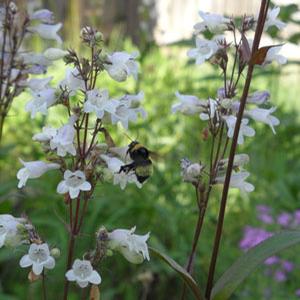
Bumblebees have always been attracted to my Foxglove Beardtongue. I love watching them buzz around! Photo: TBeckjord 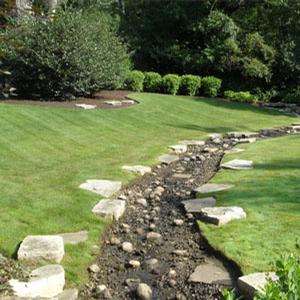
There isn’t much here to offer habitat, food, or shelter. I was struck by the missed opportunity and the level of maintenance that must be required to keep all of this so trimmed. Photo: TBeckjord 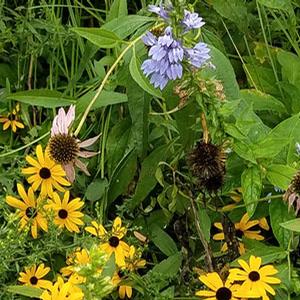
Great Blue Lobelia growing happily by the rain barrel overflow in my garden. A serendipitous example of plants growing where they can. 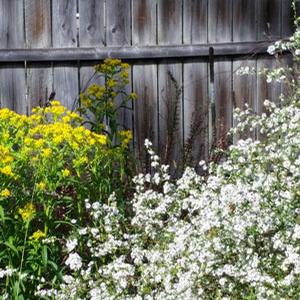
One of the white asters that found its way to the garden for a while and provided a nice contrast to the Stiff Goldenrod! The bees loved it! Photo: TBeckjord 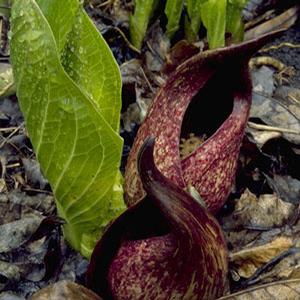
Skunk Cabbage in full flower. Photo: Ladybird Johnson Wildflower Center, Albert F.W. Vick 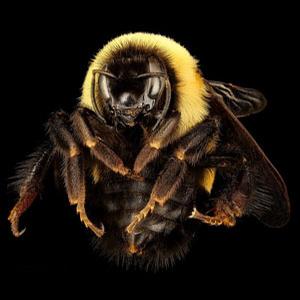
We may not think this beauty will win any contests for good looks, but I think she is gorgeous in her own right and she has an important role in our gardens! Photo: A queen Bombus affinis, collected in Racine, Wis.All photos from the U.S.G.S. Bee Inventory and Monitoring Lab
References
Climate Change Contributes to Widespread Declines Among Bumblebees Across Continents. Science.
Climate Change: It’s a Buzzkill for Bumblebees, Study Finds. New York Times.
Bumblebees Are Going Extinct in a Time of Climate Chaos. National Geographic.
How Climate Change is Messing with Bees. Smithsonian Magazine.
Bumblebee Decline Confirmed Across U.S. Science Magazine.
Back To Blog
